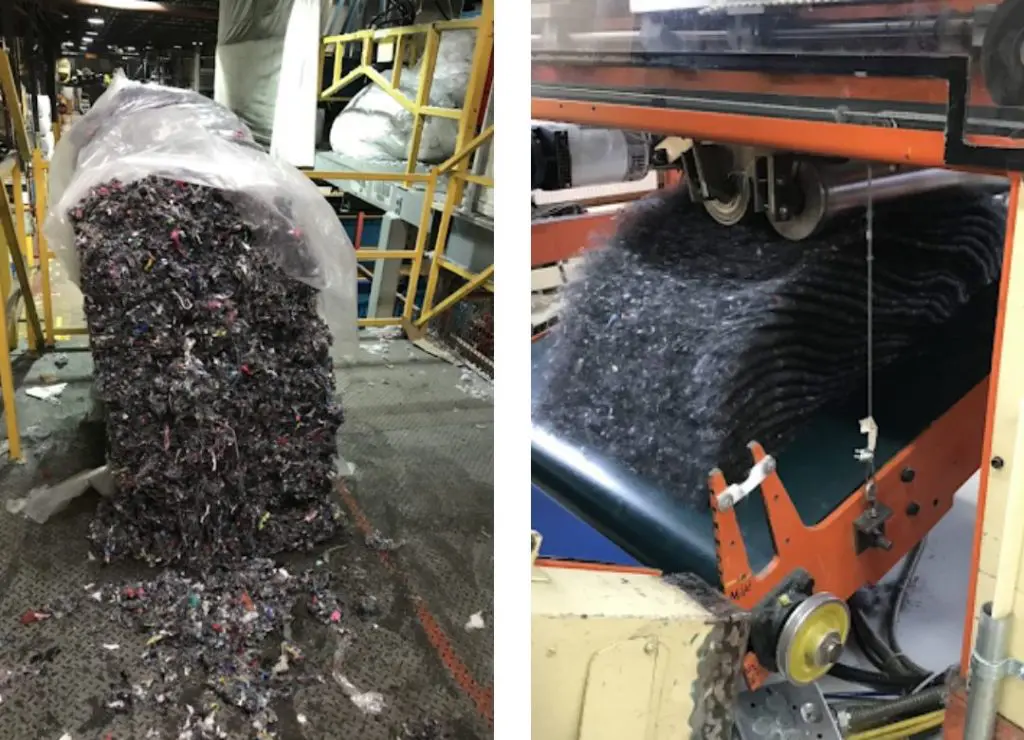Recycling has become the predominant means in Canada for diverting metal, plastic, paper, organics, batteries and old electronics from the waste stream. However, textiles are rarely considered in this, despite knowing that roughly 500,000 tonnes of textiles from the residential waste steam, and about the same amount from the IC&I sector are sent to Canadian landfills every year. This waste is expensive to manage, and is a missed opportunity to use materials that can either be resold at a profit, or to satisfy the increased global fibre demand through resource recovery. In addition, textiles in landfill creates an environmental burden. Natural textiles such as cotton, hemp and wool biodegrade in landfills and produce CO2 and Methane emissions in the process. Synthetic materials, which are made from plastic – polyester, spandex, acrylic and nylon – will not biodegrade but will rather stay in the landfills forever, not unlike a plastic bag. What most people don’t realize is that textiles account for 7 per cent of all plastics in Canadian landfills, and make up the third-largest category of plastic waste in absolute numbers after packaging and automotive (Deloitte, 2019).
Solving this problem would require all textiles to be collected and diverted from the waste stream. This is a simple solution in theory, however the processes required to achieve it are complex. It would require the consolidated efforts of numerous stakeholder groups and millions of consumers. The solution also relies on changes in social and technological processes that require innovations and research to close the knowledge gaps and to define best practices.
Fashion Takes Action (FTA) is committed to reducing the volume of textiles going into Canada’s landfills, while ensuring the material will be efficiently reused, repurposed or recycled. As an independent NGO, we work closely with all stakeholders in the value chain such as brand owners, retailers, charities, textile collectors and sorters, as well as municipalities, academics and representatives from various levels of government. It is through this multi-stakeholder approach, that we can foster the conversation and provide a shared platform to determine both challenges and opportunities.
Textile-to-textile recycling is still in its infancy and requires massive investment, collaboration, partnerships, and the creation of networks. Our vision is for a more sustainable and circular fashion system in Canada, with a clear strategy and framework that will ultimately unite all stakeholders and accelerate action. Where there are learning gaps, we collaborate with knowledge partners both in and outside of Canada, including Accelerating Circularity, CSA Group, Circle Economy, Circular Economy Leadership Canada, and more.
In 2021 we published A Feasibility Study of Textile Recycling in Canada, with financial support from Environment and Climate Change Canada. It includes numerous recommendations on how to address the issue of textile waste in Canada. One of the recommendations was to set up a mechanical textile recycling pilot on which we are currently working.

The pilot consisted of 4 distinct phases carried out by the pilot partners and facilitated by FTA. The first phase involved collecting 100% polyester garments from consumers, sorting the material based on fibre composition, removing any contaminants like zippers and buttons, and shredding the material. In phase 2 we developed ideas for a consumer facing product made from a non-woven fabric that resulted from the collected and shredded textile material. In phase 3 we designed the final product which is a laundry hamper, which is currently in production and will be available at Canadian Tire stores across Canada in February 2023. Once we have the in-market feedback, we will develop the business case and publish a final report.
This pilot demonstrates that in order to recycle textiles in Canada, we need to build stronger local supply chains. At the same time that this pilot was being conducted, we convened a multi-stakeholder learning group from across Canada with the goal that they could eventually create their own textile recycling supply chain and scale the innovation. This pilot also shows that although limited, we have the capacity to recycle textiles in Canada, which should encourage municipalities to start setting up textile diversion programs.
Yet more R&D is required, so that we can better sort, clean, recycle, and then create yarn, fabric and eventually new garments from used textiles. We have met some Canadian entrepreneurs who are building technologies for chemical recycling or creating plant-based synthetic materials to replace the petroleum-based synthetics. This excites us, and we want to connect with all the innovators who might have solutions for further advancing the circularity of textiles in Canada! If you have a solution please reach out to us at info@fashiontakesaction.com

